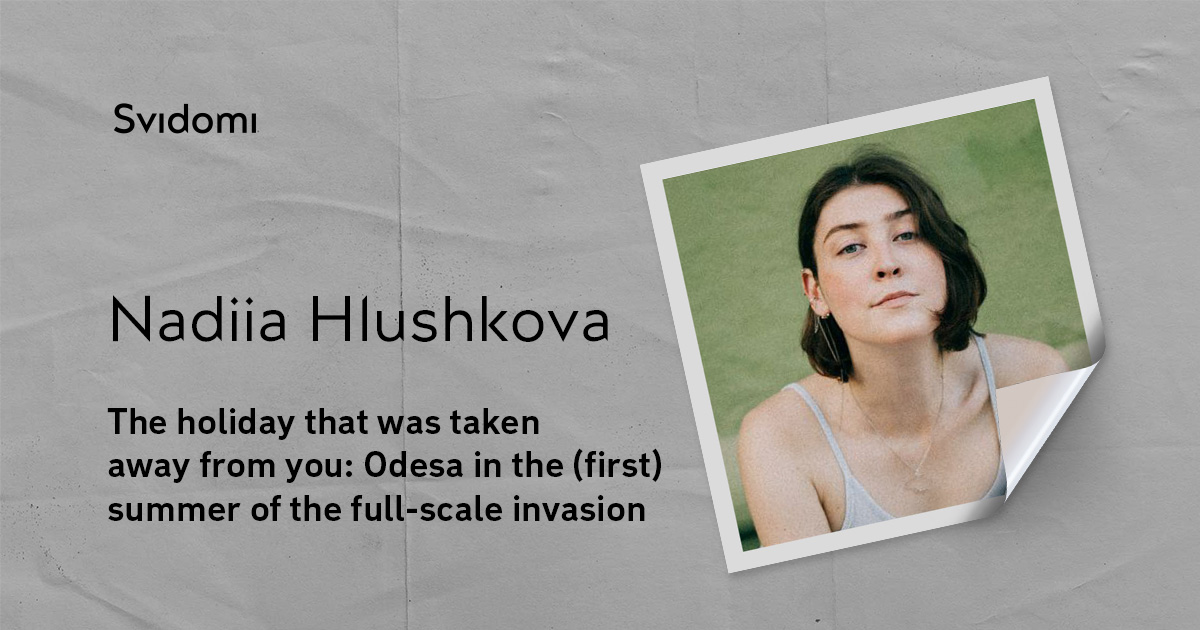The holiday that was taken away from you: Odesa in the (first) summer of the full-scale invasion
Nadiia Hlushkova

In August 2022, Odesa buses will not smell of salt and SPF. I would never have thought that it would symbolize a big war.
In the morning, I hear construction nearby — and I hardly perceive these sounds as missile hits. But I still can't believe that I miss hearing the radio playing and people shouting at construction sites at 6 am. Before, I would have given everything possible so that this did not happen. Today I wake up and dream of hearing the haunting melody of a band from the 2000s instead of the dry sounds of rebar.
When you go out, it seems that you are on one of the May holidays when people go out of town for barbecues, and you have work, so you finally get a coffee at your favourite place near the railway station without waiting in line. But the thermometer shows 30 degrees of heat, the calendar shows August, and when the evening comes, no one comes back.
My favourite coffee shop became the centre of life in one of the residential areas. I approach it and think that I once read about it in European novels. In those moments you don't understand how people laugh and sit on the summer terraces of cafes during the war. Now you have learned to feel this wire of tension that connects everyone.
Buses don't smell of salt and SPF. Nobody shakes off the sand right in the cabin, no one passes inflated flamingos that are as big as a seven-year-old child from one end of the minibus to the other. Nobody asks at which stop to get off to go down to the sea faster.
The Odesa railway station is deserted as if everyone who was supposed to leave and arrive had moved to the Pryvoz market. There are also streams of people, rustling packages with vegetables and meat, someone somewhere is trying on some sneakers, and some other people are shouting at each other over bitter milk products. This place seems like an unsettling dream on a sticky and stuffy August night. And for the first time, I understand how uncomfortable I am in such a crowd of people.
Closer to the centre, I feel what they call "as if there is no war here." I know the truth: war takes the place of those who are not here now. Friends wearing military uniforms. Friends who didn't come here for the weekend to spend the night in a hostel, eat breakfast at McDonald's, and sit at the sea all the time. Those with whom we could become friends — but we will never get to know each other. Here and now we count the known losses of the war, but we cannot even imagine the number of unknowns.
I see people on Derybasivska Street, but I know how many of them there really should be. So much that you can't push through them. The sellers of those scary mechanical dogs that bark and light up, the crowd of children who were taken to the Opera House by their camp counsellors, the foreigners who ask you to go somewhere with them.
At 6:00 p.m., teenagers at Devolanivskyi Descent say: "We will have to leave soon." And I can't believe that I miss the groups of teenagers who sit on all the benches and parapets in Shevchenko Park late in the evening.
When a bit of coolness descends on the city on the eve of a thunderstorm, the Health Route (ed. from the Langeron beach to the Arcadia area) is occupied by cyclists, skaters, and runners. They move along the empty beaches covered with grass. I would never have thought that the sight of bare sand could hurt.
I would never have thought that on hot days at the end of summer I would see this desert — and among it, beaches filled with people, as rare islands of a past life. Locals and tourists watch out for policemen. And as soon as they leave far enough, a crowd of tens of naked bodies runs into the crystal clear water just to run ashore as soon as the man on duty in wet swimming trunks shouts that the patrol is coming again.
I remember the news about the mine that hit the coast of Odesa just this morning, and I accept the fact that this summer will not be reflected on the skin by sea salt. And somewhere very deep inside, I think that all this is what life means.
But while the asphalt is not boiling from the temperature, and sunglasses can be hidden in a backpack, I walk along the Route and see an elderly man sitting under the trees and looking at the sea. And it's as if I find myself inside a tiny Odesa courtyard during World War II. Where everyone is minding their own business, but every muscle is tense, ready to flee and defend.
When thunder rolls over the city, I freeze and raise my face to the sky. The man walking toward me does the same thing.
We stop for a few seconds. The sky is silent and sinking over Odesa. On the map, I see thunder nearby, but on the way home I pick up the pace.
At night, I don't fall asleep to music from the clubs of Arcadia — and I never thought that I would miss it one day.


